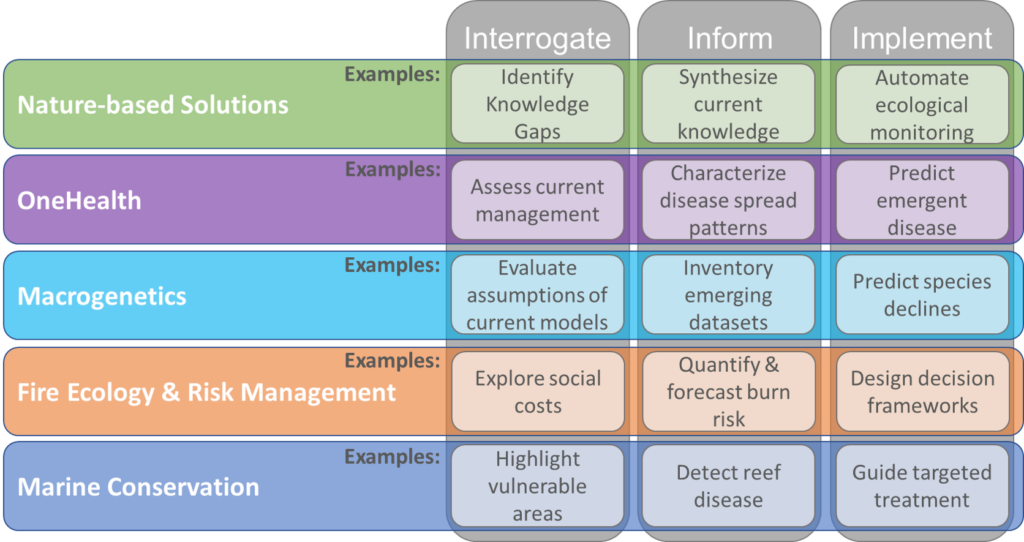Teaming for Interdisciplinary Research Pre-Seed Program
Leveraging AI for 21st Century Biodiversity Conservation

Leveraging AI for 21st Century Biodiversity Conservation

The ongoing biodiversity crisis, marked by accelerating species extinctions, habitat loss, and ecosystem degradation, is eroding the essential life support systems upon which all human well-being and economic enterprise depend. The present decade is a critical moment for conservation research and application, which will determine the welfare of people and the planet for generations. Contemporary approaches to conservation have failed to resolve this critical issue, with none of the 2010 Aichi Global Biodiversity Targets being met. Moreover, established conservation practices suffer from “blindspots” in knowledge and implementation, resulting in missed opportunities for positive impact and negative consequences for people. The rise of Artificial Intelligence (AI) technology presents exciting possibilities for revolutionizing conservation science and application, but current real-world applications are limited in number and scope, insufficiently leverage new forms of AI, and are fragmented among conventional disciplinary silos.
We request funding to support the AI for Conservation Cluster (AI4C2) team. In particular, we wish to host multiple workshops starting in Summer 2024 to develop interdisciplinary grant proposals for AI in biodiversity conservation research and draft one or more agenda-setting papers on the topic. These workshops will bring together faculty from several schools, institutions, and centers at UGA to develop innovative and paradigm-shifting approaches. This team consists of five interacting Focus Groups (see Fig 1) based on high-impact, emerging themes in biodiversity conservation. These leverage existing expertise at UGA, including infectious diseases (One Health) and resilient infrastructure (Nature-based Solutions). Across these themes, the cluster will develop proposals and scholarship for three research modes around conservation AI: for three modes of research: (1) to Interrogate contemporary research and management to highlight knowledge and application gaps, historical biases, blindspots, and emerging opportunities, (2) to Inform conservation practice by creating and synthesizing actionable knowledge, and
(3) to Implement cutting-edge conservation science in the state of Georgia and beyond.
The proposed team includes experts in artificial intelligence, computer science, ecology, conservation biology, geography, climate change, and the social aspects of environmental restoration. The team lead, Dr. Charles B. van Rees, successfully led an interdisciplinary proposal to NASA’s Ecological Conservation program in 2023. Funding to support this larger team and its interlinked focal groups will help establish a community of practice around conservation AI at UGA and support several near-term grant proposals. Ultimately, the team’s vision is to advance UGA as a leader in conservation AI and form a new center to facilitate ongoing research on this important, urgent, and timely topic.

Fig. 1: Examples of research activities in each Focal Group, organized by the three major research modes of our planned cluster on Artificial Intelligence for biodiversity conservation: Inform, Interrogate, and Implement. NOTE: AI applications in projects and proposals will not be limited to this list.
The Advancing Interdisciplinary Research for Social Impact team will work together to harness data science and AI-based approaches to improve the health and well-being of individuals and communities. All participating team members are engaged in data science and AI techniques, including computational modeling, intelligent system design, and large-scale sampling methods. Despite this, we have yet to establish a unified vision for integrating these techniques effectively. Through a translational science team model, we will integrate complementary methodologies and frameworks to translate our research into practical solutions that maximize impact on the health and well-being of individuals and communities. Through enhanced communication and collaboration, we can identify synergies among team member initiatives and develop priority areas within a health and wellbeing framework for optimal impact. By refining our team-based research agenda, we can strengthen our research capacity to provide practical, feasible, and evidence-based approaches to address persistent health and well-being challenges. We anticipate that our efforts will attract funding from sources including NIH, NSF, and multiple foundations.
Team Lead
Charles Van Rees
cbv95576@uga.edu
Odum School of Ecology
Team Members
Mark Hunter
mdhunter@uga.edu
Odum School of Ecology
Odum School of Ecology
Tamika Lunn
tamika.lunn@uga.edu
Odum School of Ecology
Odum School of Ecology
Jimmy Nelson
jimmy.nelson@uga.edu
Franklin College of Arts and Sciences
Marine Sciences
Laura German
lgerman@uga.edu
Franklin College of Arts and Sciences
Anthropology
Elizabeth King
egking@uga.edu
Odum School of Ecology & Warnell School of Forestry and Conservation
Odum School of Ecology & Warnell School of Forestry and Conservation
Shannon Quinn
spq@uga.edu
Franklin School of Computing
Franklin School of Computing
Anna Harper
a.harper@uga.edu
Franklin College of Arts and Sciences
Geography
